Sustainability
Sustainability is the ability to maintain or keep something in existence without depleting its resources or causing harm to the environment. It involves meeting the needs of the present without compromising the ability of future generations to meet their own needs.
Key Concepts:
- Environmental Impact: Understanding how human activities affect the environment, including air and water pollution, deforestation, and loss of biodiversity.
- Resource Conservation: Managing and using natural resources such as water, energy, and land in a way that ensures their availability for future generations.
- Social Responsibility: Promoting fair labor practices, human rights, and community well-being in economic development and decision-making.
- Economic Stability: Balancing economic growth and development with the long-term health of ecosystems and the well-being of people.
- Renewable Energy: Investing in and utilizing energy sources that can be replenished, such as solar, wind, and hydroelectric power.
- Waste Reduction: Minimizing waste generation and promoting recycling, composting, and responsible disposal of materials.
Study Guide:
- What is sustainability and why is it important for the future of our planet?
- Identify and explain the three pillars of sustainability: environmental, social, and economic.
- Give examples of unsustainable practices and their potential consequences on the environment and society.
- Discuss the role of renewable energy in promoting sustainability and reducing reliance on fossil fuels.
- Explore ways in which individuals, communities, and businesses can contribute to sustainability efforts in their daily lives.
- Research a sustainability initiative or project in your local area and analyze its impact on the environment and community.
◂Science Worksheets and Study Guides Sixth Grade. Introduction to earth science
Study Guide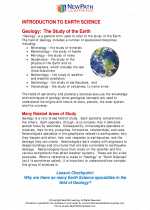 Introduction to earth science
Introduction to earth science  Activity Lesson
Activity Lesson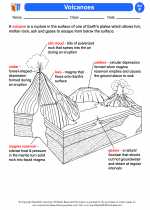 Volcanoes
Volcanoes  Worksheet/Answer key
Worksheet/Answer key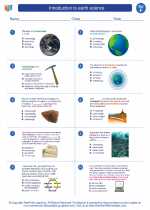 Introduction to earth science
Introduction to earth science  Worksheet/Answer key
Worksheet/Answer key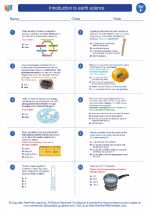 Introduction to earth science
Introduction to earth science  Worksheet/Answer key
Worksheet/Answer key Introduction to earth science
Introduction to earth science  Vocabulary/Answer key
Vocabulary/Answer key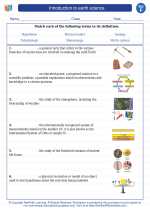 Introduction to earth science
Introduction to earth science  Vocabulary/Answer key
Vocabulary/Answer key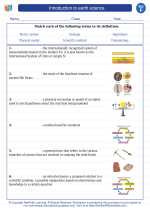 Introduction to earth science
Introduction to earth science 

 Activity Lesson
Activity Lesson
 Worksheet/Answer key
Worksheet/Answer key
 Worksheet/Answer key
Worksheet/Answer key
 Worksheet/Answer key
Worksheet/Answer key
 Vocabulary/Answer key
Vocabulary/Answer key
 Vocabulary/Answer key
Vocabulary/Answer key

The resources above cover the following skills:
EARTH AND SPACE SCIENCE